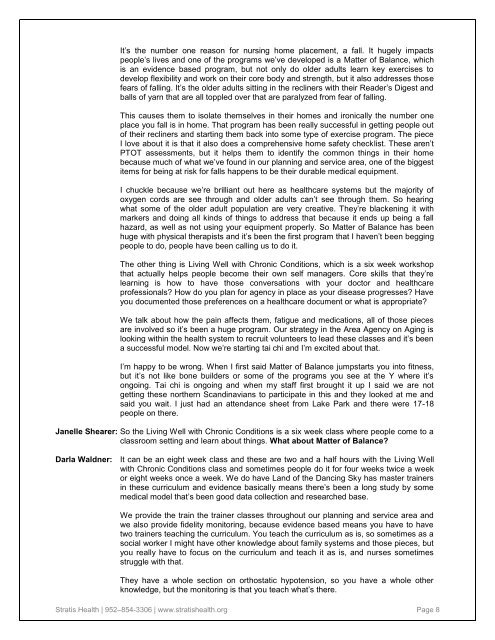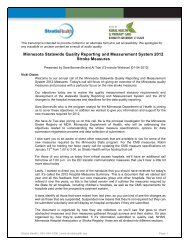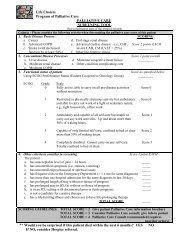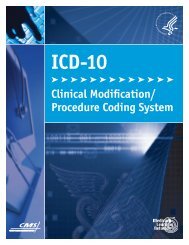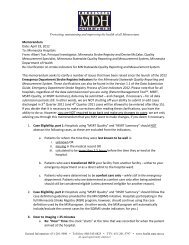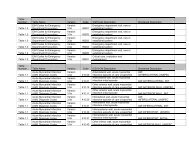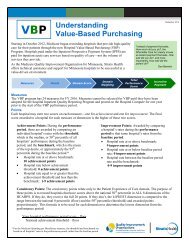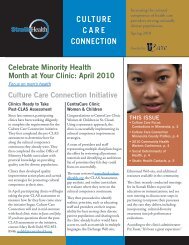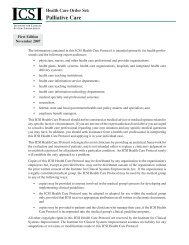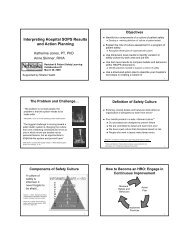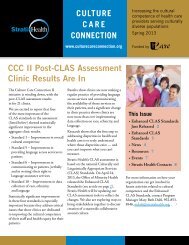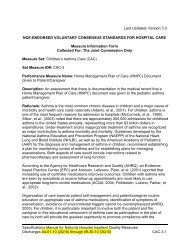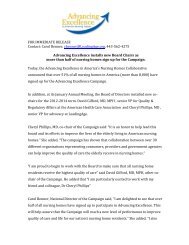Webinar Transcript Template - Stratis Health
Webinar Transcript Template - Stratis Health
Webinar Transcript Template - Stratis Health
Create successful ePaper yourself
Turn your PDF publications into a flip-book with our unique Google optimized e-Paper software.
It’s the number one reason for nursing home placement, a fall. It hugely impacts<br />
people’s lives and one of the programs we’ve developed is a Matter of Balance, which<br />
is an evidence based program, but not only do older adults learn key exercises to<br />
develop flexibility and work on their core body and strength, but it also addresses those<br />
fears of falling. It’s the older adults sitting in the recliners with their Reader’s Digest and<br />
balls of yarn that are all toppled over that are paralyzed from fear of falling.<br />
This causes them to isolate themselves in their homes and ironically the number one<br />
place you fall is in home. That program has been really successful in getting people out<br />
of their recliners and starting them back into some type of exercise program. The piece<br />
I love about it is that it also does a comprehensive home safety checklist. These aren’t<br />
PTOT assessments, but it helps them to identify the common things in their home<br />
because much of what we’ve found in our planning and service area, one of the biggest<br />
items for being at risk for falls happens to be their durable medical equipment.<br />
I chuckle because we’re brilliant out here as healthcare systems but the majority of<br />
oxygen cords are see through and older adults can’t see through them. So hearing<br />
what some of the older adult population are very creative. They’re blackening it with<br />
markers and doing all kinds of things to address that because it ends up being a fall<br />
hazard, as well as not using your equipment properly. So Matter of Balance has been<br />
huge with physical therapists and it’s been the first program that I haven’t been begging<br />
people to do, people have been calling us to do it.<br />
The other thing is Living Well with Chronic Conditions, which is a six week workshop<br />
that actually helps people become their own self managers. Core skills that they’re<br />
learning is how to have those conversations with your doctor and healthcare<br />
professionals? How do you plan for agency in place as your disease progresses? Have<br />
you documented those preferences on a healthcare document or what is appropriate?<br />
We talk about how the pain affects them, fatigue and medications, all of those pieces<br />
are involved so it’s been a huge program. Our strategy in the Area Agency on Aging is<br />
looking within the health system to recruit volunteers to lead these classes and it’s been<br />
a successful model. Now we’re starting tai chi and I’m excited about that.<br />
I’m happy to be wrong. When I first said Matter of Balance jumpstarts you into fitness,<br />
but it’s not like bone builders or some of the programs you see at the Y where it’s<br />
ongoing. Tai chi is ongoing and when my staff first brought it up I said we are not<br />
getting these northern Scandinavians to participate in this and they looked at me and<br />
said you wait. I just had an attendance sheet from Lake Park and there were 17-18<br />
people on there.<br />
Janelle Shearer: So the Living Well with Chronic Conditions is a six week class where people come to a<br />
classroom setting and learn about things. What about Matter of Balance?<br />
Darla Waldner: It can be an eight week class and these are two and a half hours with the Living Well<br />
with Chronic Conditions class and sometimes people do it for four weeks twice a week<br />
or eight weeks once a week. We do have Land of the Dancing Sky has master trainers<br />
in these curriculum and evidence basically means there’s been a long study by some<br />
medical model that’s been good data collection and researched base.<br />
We provide the train the trainer classes throughout our planning and service area and<br />
we also provide fidelity monitoring, because evidence based means you have to have<br />
two trainers teaching the curriculum. You teach the curriculum as is, so sometimes as a<br />
social worker I might have other knowledge about family systems and those pieces, but<br />
you really have to focus on the curriculum and teach it as is, and nurses sometimes<br />
struggle with that.<br />
They have a whole section on orthostatic hypotension, so you have a whole other<br />
knowledge, but the monitoring is that you teach what’s there.<br />
<strong>Stratis</strong> <strong>Health</strong> | 952–854-3306 | www.stratishealth.org Page 8


